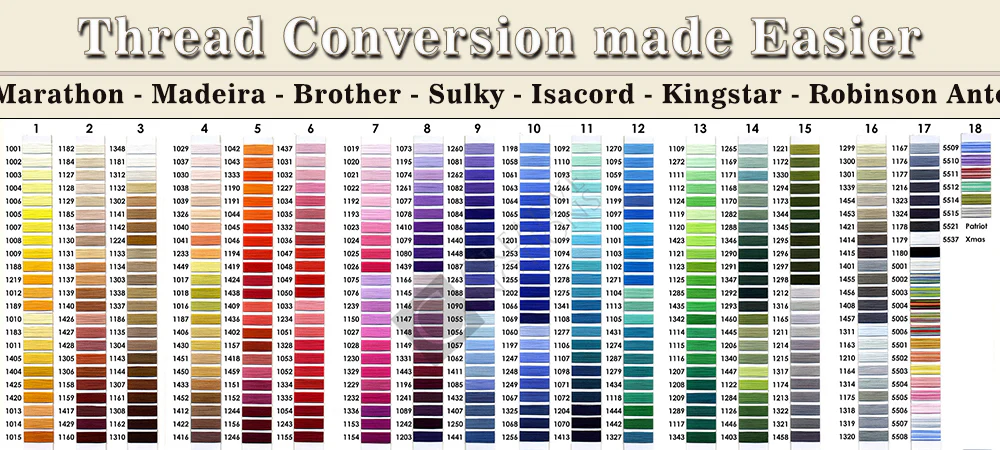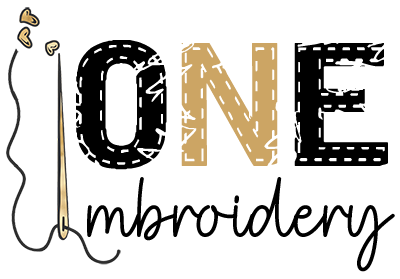Blog
How do I Choose Embroidery Threads?
Embroidery, the timeless craft that has adorned textiles for centuries, remains a popular hobby and profession due to its intricate beauty and personal touch. When it comes to creating a stunning piece, the choice of embroidery threads is as crucial as the technique itself. With a plethora of thread types, materials, and colors available in the market, choosing the right thread can be an overwhelming decision. In this blog post, we will unravel the spools of confusion and provide you with practical tips to select the perfect embroidery threads that will not only complement your design but enhance the durability and aesthetic appeal of your embroidery projects. Stay tuned as we thread the needle together and embark on this colorful journey of selection and creativity.
Embroidery Thread Quality: Understanding Your Choices
Embroidery is an art form that conveys elegance and detail in every stitch. The cornerstone of this craft lies in the threads used, which come in a variety of materials, each with its unique characteristics.
- Cotton thread is renowned for its classic, matte finish and its traditional tenure in the embroidery industry, ideal for heirloom and vintage projects.
- Rayon thread, on the other hand, boasts a high sheen, mimicking silk, and is superbly suited for decorative embroidery that demands a luxurious appearance.
- Polyester thread is the workhorse of the trio – incredibly durable, colorfast, and resistant to chlorine and sunlight. It is the go-to thread for items that require frequent washing or exposure to harsh conditions, such as outdoor apparel and children’s clothing.
Selecting the right thread material is essential and depends on the nature of the project, the desired aesthetics, and the durability required.
Navigating Thread Weights for Machine Embroidery
Embroidery machines, with their precision and ability to recreate intricate designs, require the use of threads that complement their capabilities. Thread weight, a numerical term that often confuses beginners, is quintessential to understand for optimized machine performance. The ‘weight‘ of thread actually refers to its thickness; the higher the weight number, the thinner the thread, and vice versa.
For most machine embroidery work, a 40-weight thread is the gold standard, offering a balance that is neither too thin nor too thick, ensuring a detailed and robust design. Heavier threads, such as 30-weight, can be used when a more pronounced texture is desired, while finer threads, like 60-weight, are perfect for small lettering or fine, delicate details. Always consider the weight in relation to the design’s complexity and the fabric’s texture to accomplish exceptional embroidery.
Top Embroidery Thread Brands in the Market
Thread embroidery Conversion Chart
Each thread brand offers its unique range of colors and finishes.
The sheen of Marathon Rayon threads adds depth and vibrancy to your embroidery, while Marathon Poly threads are known for their strength and colorfastness, making them ideal for items that undergo frequent laundering. Janome threads are specially designed to work seamlessly with Janome machines, ensuring high-quality and consistent stitching. Madeira boasts an incredible palette and is celebrated for its durability and resistance to fading. Meanwhile, Robinson Anton provides excellent performance on high-speed machines, with a reputation for creating intricate designs with ease.
For those in love with metallics, Kingstar offers a lustrous selection that brings glamour to any design. The Brother Disney lineup is perfect for crafting delightful designs inspired by beloved Disney characters. If smooth operation and minimal breakage are what you seek, Sulky Rayon provides just that with a soft and pliable finish.
Lastly, Isacord is cherished for its ability to maintain color integrity after rigorous washing, perfect for workwear or sports garments where durability is key.

Source: Stitchdelight.net
But how do you navigate when your design calls for a specific brand color that you don’t have? That’s where a comprehensive conversion chart comes in handy. Such a conversion chart doesn’t just list equivalent colors; it’s a treasure map to guide you through the labyrinth of shades. You’ll find the conversion threads chart in pdf format at this link, and you can download it here : Thread embroidery Conversion Chart
For those ready to stock their thread arsenal, we’ve curated affiliate links for each brand, ensuring that you can easily purchase the perfect match for your next project:
- Discover Robinson Anton Threads
- Isacord Threads for Durability
-
BUY New brothread 80 Spools Polyester Embroidery Machine Thread : Colors Compatible with Janome and Robison-Anton Colors
-
BUY Simthread 80 Spools Polyester Embroidery Machine Thread: Compatible with Brother, Janome, Singer, Bernina
-
BUY Simthread 120 Madeira Colors Polyester Machine Embroidery for Home Embroidery Sewing Machines
-
For metallic embroidery thread colors we recommend : New brothread 20 Assorted Colors Metallic Embroidery Machine Thread
-
To add a luminous touch to your projects we recommend: New brothread 16 Colors Luminary Glow in The Dark Embroidery Machine Thread.
THREADS: the most important things to know
-
Vibrancy of Colors: Choose threads with high-quality dye processes to ensure your embroidered designs retain their color and vibrancy over time. Fade-resistant threads keep your projects looking fresh and new.
-
Material Matters: Understand the differences between rayon, polyester, cotton, silk, and metallic threads. Each material has unique properties that affect sheen, strength, and suitability for various fabric types.
-
Thread Weight is Key: Familiarize yourself with thread weights and how they impact the final appearance of your embroidery. For finer details, opt for lighter weights; for bolder and more pronounced stitches, choose heavier weights.
-
Consider the Project’s Purpose: If the embroidered item will be frequently washed, like clothing or linens, polyester threads offer excellent colorfastness and durability. For heirloom or display pieces, silk’s natural luster may be more appropriate.
-
Durability for Every Day Use: For workwear or children’s clothes, select threads designed to withstand abrasion and repeated laundering. Industrial-grade polyester threads are often a good choice.
-
Special Effects and Purpose: Reflective, glow-in-the-dark, or variegated threads can add unique dimensions to your artwork. Decide on the special effects based on the purpose of your embroidery project.
-
Avoid Cheap Threads: Investing in quality threads can save you from future headaches caused by frequent thread breaks, uneven tension, and poor coverage.
-
Compatibility with Your Machine: Ensure the threads you choose are compatible with your embroidery machine. Threads that are too thick or too fine can cause problems with tension and stitch quality.
-
Storage and Handling: Properly store your threads away from direct sunlight and dust to maintain their quality. Handle metallic and delicate threads with care to avoid tangling and fraying.
Remember, the right thread does not just add color to your designs—it brings durability, character, and quality to your embroidery projects.

